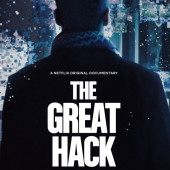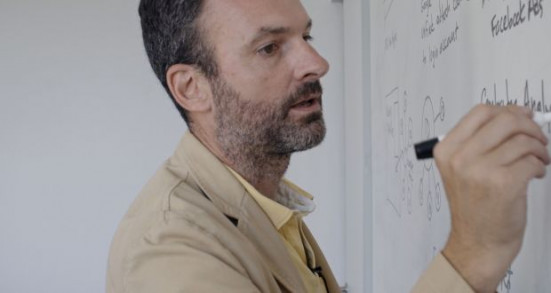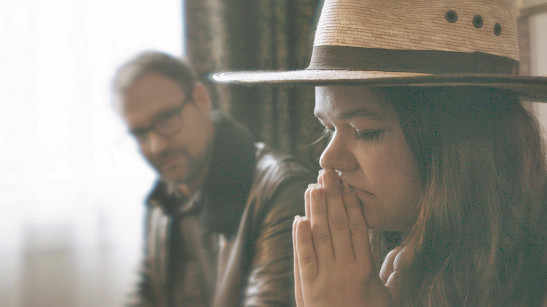Our website uses cookies so we can analyse our site usage and give you the best experience. Click "Accept" if you’re happy with this, or click "More" for information about cookies on our site, how to opt out, and how to disable cookies altogether.
We respect your Do Not Track preference.

“Our personal data is out there and being used against us in ways we don’t understand.” – Assoc Prof David Carroll.
What are the implications for societies and democracies when social networks understand our likes, dislikes, hopes and fears better than we do? The uses and abuses of personal data by powerful tech companies is one of the central themes explored in Netflix’s new documentary, The Great Hack. It traces the rise and fall of the now defunct British political consulting firm, Cambridge Analytic (CA), their work with Facebook, and the prominent role both played in Donald Trump’s narrow 2016 US election victory.

David Carroll, took CA to court for the right to know what information they held about him. Photo: Netflix
The documentary’s narrative is propelled by the personal journey of Associate Professor of Media Design, David Carroll. In the fallout of the 2016 election, Carroll embarked on a quest to obtain the data that Cambridge Analytica held about him. This journey takes him from the US to the UK as he meets and interacts with former CA staff members and asks probing questions regarding the role large tech companies are playing in our democracies and lives.
Prior to its collapse, CA was headed by smooth-talking Alexander Nix. The company's vice president was Steve Bannon, the former head of Trump’s election campaign and former editor of right-wing website, Breitbart. CA harnessed unprecedented insights into the psyches of individual US voters after it scraped data from 87 million Facebook profiles using a quiz application called This is Your Life. While just 270,000 US FB users took the quiz, anyone who was friends with quiz-takers was also caught in the net. CA later claimed to prospective clients to have 5,000 unique data points on 230 million American voters (the veracity of this claim is unknown).
Although Hillary Clinton’s campaign fundraised far more money than Donald Trump’s during the 2016 campaign, when it came to online targeted advertising, Trump’s digital campaign director claimed to have posted 5.9 million visual ads to Facebook compared to Hillary Clinton’s paltry 66,000.
Prior to working in the States, Cambridge Analytica were involved in ethically dubious election campaigns in numerous developing countries including Trinidad and Tobago (where they helped suppress black youth voter turnout), Afghanistan and Iraq. It was in those nations they sharpened their teeth and honed their ability to analyse and manipulate political opinions and public will. CA’s role in the UK’s Leave campaign was briefly touched upon (a CA staff member is visible at the launch party for Leave.eu) but the full extent of their engagement is left unanswered.
Several former CA employees are featured in the documentary including 28-year-old, pink-haired Christopher Wylie. Wylie spoke to the Observer in 2018, blowing the lid on all the insidious activity CA had engaged in. He should know - he was one of the main actors developing the tools to weapoinise people’s data.
Likewise, Brittany Kaiser is introduced as the high-profile former CA employee who helped secure CA’s contract to work on Trump’s campaign. She had previously worked as Obama campaign intern in 2008 and 2012 and claims her shift to the ‘dark side’ was due to financial pressures her family suffered following the global financial crisis of 2008.

Brittany Kaiser won CA the contract to work with the Trump campaign. Photo: Netflix
“We bombarded them (US voters) - from blogs, websites, articles, videos, ads; every platform you could imagine, until they saw the world the way we wanted them to,” she said.
The CA whistle-blowers featured seem to be trying to extricate themselves from the wrong side of history. Whether they are truly remorseful for their roles in the company is less than clear.
The work that CA engaged in naturally raises questions regarding our own susceptibility to manipulation and propaganda. We already know that with a surprisingly small number of data points, algorithms can predict with greater accuracy than we ourselves can, what we will like.
According to Statista, in 2018 slightly over three quarters of New Zealanders aged over 18 were active social media users. We already know that teams of clever Silicon Valley ‘attention engineers’ work to make us addicted to these platforms. The interactions we have with our friends and family on these platforms, termed “behavioural surplus” by academic and author Shoshana Zuboff, are attached to our identities, giving advertisers (and other actors) unprecedented access to our emotional pulses.
Eight years ago, following the Occupy Wall Street protests of 2011 and the Arab Spring - Facebook and Twitter were praised for their democratic potential. Social media was helping people spontaneously organise and express themselves in ways that had never before been possible. In recent years, with multiple large-scale scandals including tax avoidance, data breaches, live streaming of terrorist attacks, facilitation of toxic online behaviour, partisanship and so forth - idealistic visions of social media platforms have substantially soured.
Several weeks back, Facebook was able to absorb a $5 billion US fine from the FTC for their role in the Cambridge Analytica scandal. In fact, Facebook’s share price increased. Brittany Kaiser says the worth of the tech companies is in the data they hold. She suggests that we should possess our data like property and be compensated for it.
A point made by a former CA manager was that, given the types of data social media collects from us – it was almost inevitable that this type of company would spring up. That begs the question: how many other actors like CA are operating right now?
Could we have large social media platforms that don’t abuse our privacy and manipulate us? This documentary elucidates the extent to which the law often lags far behind the development of new digitial technologies. It made me examine my own use of social media and whether, given everything, it’s something I want to continue to be a part of. Problem is - now that these companies are so deeply enmeshed in most of our lives - it can be very difficult to opt out.
A must-watch.
4.5/5
Watch the trailer for below. Image credit: The Great Hack poster image via IMDB.
Back